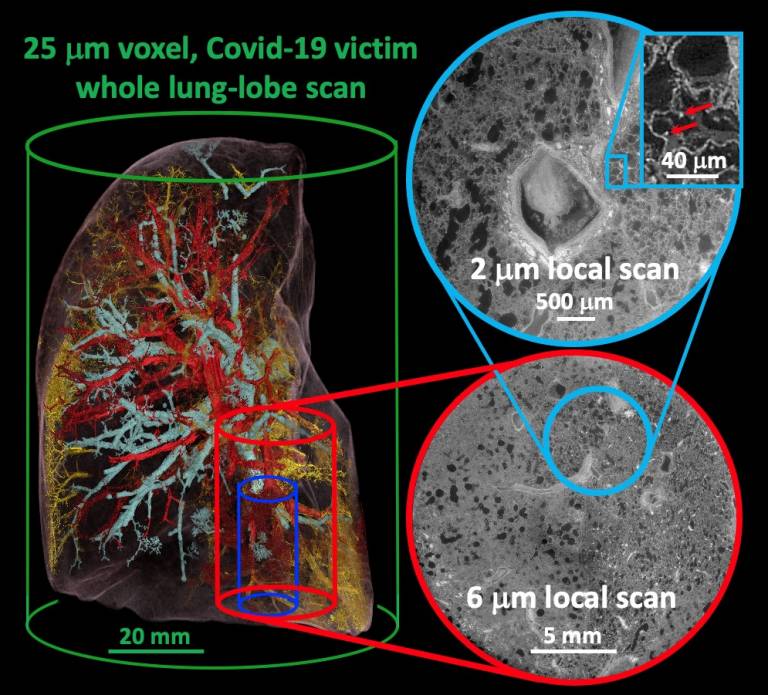Imaging to inform models of whole organ behaviour in health and disease
A 3-year funded PhD studentship - Now Closed.

14 December 2020
Imaging to inform models of whole organ behaviour in health and disease
Primary Supervisors: Profs. Rebecca Shipley and Peter D Lee
A 3-year PhD studentship is available in the UCL Department of Mechanical Engineering. The funding covers an annual tax-free stipend (at least £17,009 p.a.) and home tuition fees. The successful candidate will join the UCL CDT in Intelligent, Integrated Imaging in Healthcare (i4health) cohort and benefit from the activities and events organised by the centre.
Project Background
We have recently developed a method for using high-energy X-rays to create images of whole human organs at high resolution (ca. 1 µm) and in three dimensions, called HiP-CT. The 3D (and 3D plus time) images from this method will be used to simulate biophysical processes in the human body from blood and air flow to joint movement; allowing investigations into dynamics processes with real human organ geometries with a resolution up to 100 times greater than prior studies.
The images are generated using the European Synchrotron Radiation facility (ESRF) in Grenoble, where you will have the opportunity to spend on placement. This X-ray source offers the brightest and most coherent high energy beam in the world, allowing us to image entire human organs (including lung, heart, brain) with 25µm resolution, and then zoom in on cellular structures at ~1.2µm resolution without cutting the tissue. We have imaged human organs in health and disease (Covid-19 victims, see https://mecheng.ucl.ac.uk/HiP-CT).
We have recently received a Chan Zuckerberg initiative grant to further develop this technique. You will be part of this international team of scientists, X-ray physicists and medics working to develop this technique and apply it to hopefully image organism development, whole organs, and finally the whole human body.
Your role will be to help develop ML segmentation techniques and then use the segmented synchrotron data as input for models of blood flow prediction, air flow prediction, and drug delivery. Models of joint motion are also possible, coupled to DVC measurement of nano-strains during mechanical loading, depending on the student’s interests. The models will be used as a tool to infer insights about physiology and pathophysiology from the structural data sets.
Research aims
To use segmented synchrotron data from a variety of organs as input for established and novel models of: blood flow prediction, air flow prediction, drug delivery. Using these models, you will predict functional information from segmented structural information, providing new insights into the function of the human body in health and disease (including Covid-19).
Requirements
• Have achieved (or are predicted) a first class or upper second class honours undergraduate degree (or equivalent international qualifications or experience). An MSc is also preferred, though not essential.
• Our preferred subject areas are Physical Sciences (Computer Science, Engineering, Mathematics and Physics) with a preferred route through any core Engineering discipline (e.g. Bioengineering/Biomedical Engineering, Mechanical Engineering, Chemical, Electrical Engineering, etc.). All applicants must be able to demonstrate strong mathematical skills and ideally have experience in modelling.
• Applicants should have an interest in bioengineering combined with medical imaging as this is core to our projects.
• Applicants whose first language is not English are usually required to provide evidence of proficiency in English by UCL.
Funding
Please note that the funding available supports Home students or EU nationals who have obtained ‘settled’ or ‘pre-settled status’ via the EU Settlement Scheme Please refer to the UCL website for further details about the EU Settlement Scheme. Confirmation of settlement status will be required at the point of application and should be provided as an additional document during the application process.
Further guidance relating to UKRI funding eligibility found here.
How to apply
Please send an expression of interest and current CV to Prof Shipley rebecca.shipley@ucl.ac.uk
Deadline - Now Closed
 Close
Close

